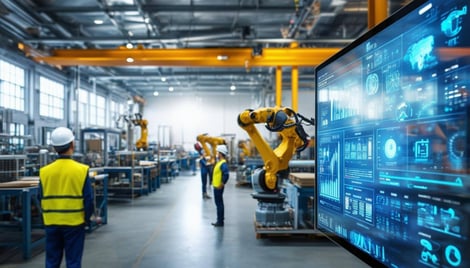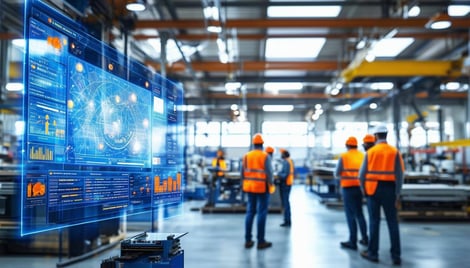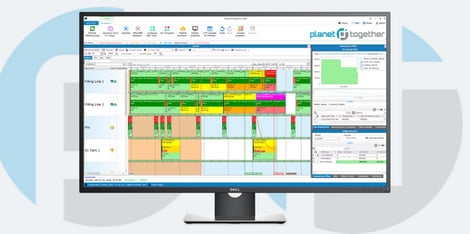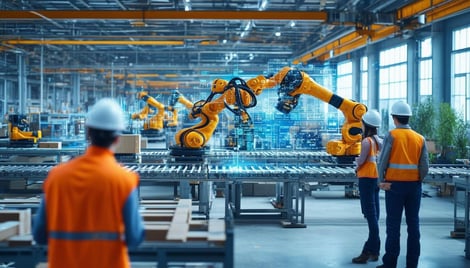
Harnessing AI Analytics and Predictions in Industrial Manufacturing Supply Chains
In an era defined by rapid technological evolution and market volatility, industrial manufacturing supply chains face mounting pressures to perform at peak efficiency while remaining resilient to disruptions. For Supply Chain Managers, the ability to forecast demand accurately, optimize inventory, and streamline operations is not just a competitive advantage but a business necessity. This is where Artificial Intelligence (AI) analytics and predictive capabilities come into play, revolutionizing supply chain management by offering unparalleled insights and foresight.
One of the critical aspects of achieving this transformation is leveraging tools like PlanetTogether integrated with enterprise resource planning (ERP) systems such as SAP, Oracle, Microsoft, Kinaxis, or Aveva.
This blog explores how AI analytics and predictive technologies, when integrated into supply chain workflows, empower Supply Chain Managers to unlock new efficiencies and drive strategic decision-making.

The Growing Importance of AI in Supply Chains
AI has emerged as a cornerstone of digital transformation in industrial manufacturing. Its ability to process vast datasets, identify patterns, and generate actionable insights enables organizations to address complex supply chain challenges. Key drivers for adopting AI in supply chains include:
Enhanced Forecast Accuracy: By analyzing historical data and real-time market signals, AI models can deliver highly accurate demand forecasts, reducing the risk of overproduction or stockouts.
Inventory Optimization: AI-powered tools assess inventory levels across the supply chain to ensure the right amount of stock is available at the right locations, minimizing carrying costs and maximizing customer satisfaction.
Proactive Risk Management: AI predictions help identify potential disruptions, such as supplier delays or geopolitical risks, allowing Supply Chain Managers to take preemptive actions.
Improved Decision-Making: Insights derived from AI analytics enable more informed, data-driven decisions that align with strategic objectives.

The Role of Integration: PlanetTogether and Leading ERP Systems
The full potential of AI in supply chain management can only be realized when integrated seamlessly with existing systems. PlanetTogether, a leading advanced planning and scheduling (APS) software, excels in bridging the gap between operational planning and execution. By integrating PlanetTogether with ERP systems like SAP, Oracle, Microsoft, Kinaxis, or Aveva, industrial manufacturers can:
Centralize Data: Achieve a unified view of supply chain operations by consolidating data from production schedules, inventory levels, and supplier networks.
Automate Workflows: Streamline routine tasks such as order processing and inventory replenishment through automation, freeing up resources for strategic initiatives.
Enhance Collaboration: Foster better communication and collaboration across departments, ensuring alignment between production, procurement, and logistics.
Enable Predictive Insights: Leverage AI models trained on integrated datasets to predict demand fluctuations, optimize production schedules, and identify potential bottlenecks.

Real-World Applications of AI Analytics in Industrial Supply Chains
1. Dynamic Demand Forecasting
Traditional demand forecasting methods rely heavily on historical data and static models, which often fall short in volatile markets. AI-powered solutions, integrated with PlanetTogether and ERP systems, analyze a myriad of factors, including market trends, weather patterns, and economic indicators, to produce dynamic forecasts.
For instance, a manufacturer of industrial equipment can use AI analytics to predict surges in demand driven by large-scale infrastructure projects. These insights enable proactive adjustments to production schedules and procurement plans, ensuring timely delivery and customer satisfaction.
2. Predictive Maintenance and Asset Optimization
Equipment downtime can disrupt production schedules and delay order fulfillment, leading to significant financial losses. AI analytics, integrated with operational systems, monitor machine performance in real-time and predict maintenance needs before failures occur.
When combined with PlanetTogether’s scheduling capabilities, predictive maintenance insights ensure that repairs are planned during non-peak periods, minimizing disruption to supply chain operations.
3. Supply Chain Risk Mitigation
Global supply chains are increasingly vulnerable to risks ranging from natural disasters to cyberattacks. AI analytics can identify weak links in the supply chain by assessing supplier reliability, geopolitical risks, and transportation vulnerabilities.
For example, integrating AI-driven risk assessments with ERP systems like Kinaxis allows manufacturers to develop contingency plans, such as identifying alternate suppliers or rerouting shipments in response to disruptions.
4. Sustainability and Circular Supply Chains
Sustainability is becoming a critical priority for industrial manufacturers. AI analytics support circular supply chain initiatives by optimizing resource usage, minimizing waste, and enabling product lifecycle tracking.
When PlanetTogether is integrated with Aveva’s industrial software solutions, manufacturers gain the ability to monitor environmental impacts across the supply chain and make data-driven decisions to achieve sustainability goals.
Overcoming Challenges in AI Adoption
While the benefits of AI analytics are clear, implementing these technologies is not without challenges. Supply Chain Managers must address several hurdles, including:
Data Quality and Integration: Ensuring data accuracy and compatibility across systems is crucial for reliable AI insights.
Change Management: Employees may resist adopting new technologies. Effective training and communication strategies are essential to overcome this resistance.
Cost and ROI Concerns: The initial investment in AI tools and integrations can be significant. Demonstrating tangible ROI through pilot projects and case studies helps justify these expenses.
Scalability: AI solutions must be scalable to accommodate the growing complexity and size of supply chain networks.
For Supply Chain Managers in industrial manufacturing facilities, the integration of AI analytics and predictive technologies represents a paradigm shift. By harnessing tools like PlanetTogether in conjunction with ERP systems such as SAP, Oracle, Microsoft, Kinaxis, or Aveva, organizations can achieve unprecedented levels of efficiency, resilience, and sustainability.
As the industrial landscape continues to evolve, embracing AI-driven insights and predictions will be critical for staying ahead of the competition and delivering value to customers. The time to invest in AI-powered supply chain solutions is now, and those who take the leap will be well-positioned to thrive in the future.
























LEAVE A COMMENT